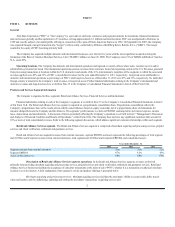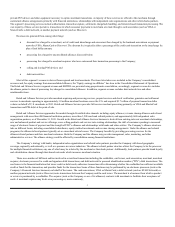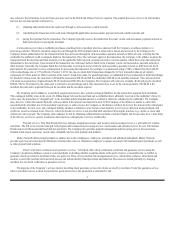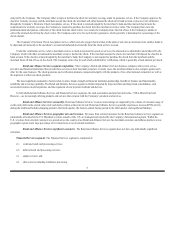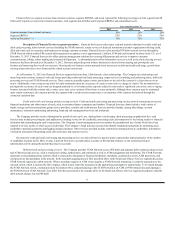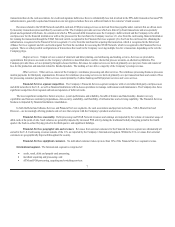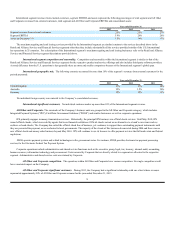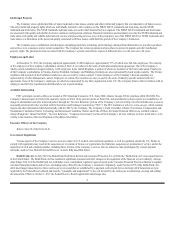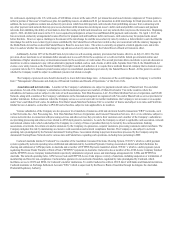First Data 2013 Annual Report Download - page 12
Download and view the complete annual report
Please find page 12 of the 2013 First Data annual report below. You can navigate through the pages in the report by either clicking on the pages listed below, or by using the keyword search tool below to find specific information within the annual report.
(“APRA”), and which requires Cashcard to adhere to conditions imposed by APRA, such as maintaining a minimum balance in the ESA.
The Company’s subsidiary in Germany, TeleCash GmbH & Co. KG (“TeleCash”), is certified and regulated as a processor for domestic German debit
card transactions by the Deutsche Kreditwirtschaft (“DK”), the German banking association. Failure to comply with the technical requirements set forth by
the DK may result in suspension or termination of services.
Because a number of the Company’s subsidiary businesses, including card issuer processing, merchant processing and STAR
Network businesses as well as those subsidiaries engaged in the business of ATM deployment, provide data processing services for financial institutions,
they are subject to examination by the Federal Financial Institutions Examination Council, an interagency body comprised of the federal bank and thrift
regulators and the National Credit Union Association and national regulatory bodies.
FDR Limited (“FDRL”) in the United Kingdom is authorized and regulated by the Financial Conduct Authority (“FCA”). The FCA is the single
regulatory authority for the full range of financial services in the United Kingdom, including banking, investment, mortgage and insurance mediation
services. FDRL is authorized by the FCA to carry on an insurance mediation business for the purpose of arranging insurance to its issuer customers’
cardholders. As an FCA regulated firm, FDRL is required to meet certain prudential and conduct of business requirements.
In the European Union, Directive 2007/60 EC, the “Payment Services Directive,” was released by the European Parliament and by the Council on
November 13, 2007, setting a framework for future regulation of bodies and corporations such as the national central banks, financial institutions, e-money
institutes and payment institutions. The Payment Services Directive was implemented in most EU member states via national legislation effective
November 1, 2009. As a result of the implementation of the Payment Services Directive, a number of the Company’s subsidiaries in the International segment
have applied for and received a Payment Institution License in the countries where such subsidiaries do business. As licensed payment institutions, the
relevant entities are subject to regulation and oversight in the applicable member state, which includes amongst other things, the requirement to maintain
specified regulatory capital.
First Data Trust Company, LLC (“FDTC”), engages in trust activities previously conducted by the trust department of a former banking subsidiary of
the Company. FDTC is subject to regulation, examination and oversight by the Division of Banking of the Colorado Department of Regulatory Agencies.
These financial institution subsidiaries are also subject to various national and local banking and consumer protection laws and regulations that apply to the
activities they conduct. Since FDTC is not a “bank” under the Bank Holding Company Act of 1956, as amended (“BHCA”), the Company’s affiliation with
FDTC does not cause it to be regulated as a bank holding company or financial holding company under the BHCA.
TeleCheck Payment Systems Limited in Australia holds an Australian Financial Services License under Chapter 7 of the Corporations Act, which
regulates the provision of a broad range of financial services in Australia. The license, issued by the Australian Securities and Investments Commission,
entitles the Australian operations of TeleCheck to deal in and provide general financial product advice about its check guarantee and check verification product
(which falls within the definition of a risk management product under the legislation). The License and the Act requires that TeleCheck’s Australian operations
issue product documents that comply with specific content requirements and follow prescribed procedures failing which penalties apply.
Further, in the Company’s International segment, several subsidiaries provide services such as factoring or settlement that make them subject to
regulation by local banking agencies, including the National Bank of Slovakia, the National Bank of Poland and the German Federal Financial Supervision
Agency.
Each of the Company’s segments provides services that may be subject to various state, federal, and
foreign privacy laws and regulations. Relevant federal privacy laws include the Gramm-Leach-Bliley Act, which applies directly to a broad range of financial
institutions and indirectly (or in some instances directly) to companies that provide services to financial institutions. Relevant foreign privacy laws include
Directive 95/46/EC as implemented in each member state of the European Union (however member states have their own privacy laws which in some cases
may be more restrictive than the Directive and impose additional duties on companies regarding registration/notification requirements and handling/transfer of
personal data); the Australian Privacy Act; and the Personal Information Protection and Electronic Documents Act in Canada. These laws and their
implementing regulations restrict certain collection, processing, storage, use, and disclosure of personal information, require notice to individuals of privacy
practices, and provide individuals with certain rights to prevent use and disclosure of protected information. These laws also impose requirements for the
safeguarding and proper destruction of personal information through the issuance of data security standards or guidelines. Certain federal and state laws
impose similar privacy obligations and, in certain circumstances, obligations to notify affected individuals, state officers, the media, and consumer reporting
agencies, as well as businesses and governmental agencies that own the information, of security breaches affecting personal information. In addition,
11



